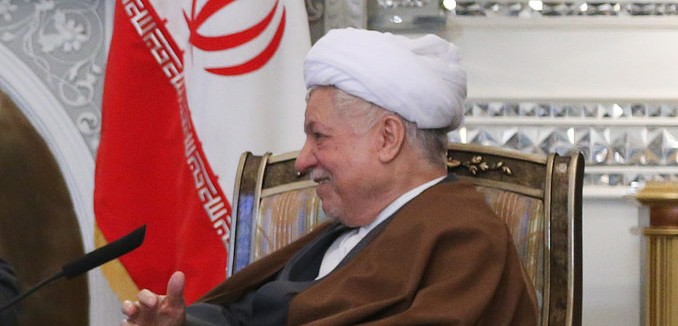In an interview with the Iranian newspaper Etemad, former Iranian President Ali Akbar Hashemi Rafsanjani admitted that Tehran sought and received assistance in starting its illicit nuclear enrichment program from the notorious Pakistani nuclear bomb dealer A. Q. Khan, according to a translation published by the Foundation for Defense of Democracies on Tuesday.
We had talks with the Pakistanis, a scientist called Mr. Abd al-Qadir Khan [A.Q. Khan].”
“During my visits to Pakistan, I wanted to meet him, but they did not introduce him to me. Ayatollah Khamenei, too, did not meet him. But during the [Iran-Iraq] war, we both tried to restart the program. It seems Mr. Abd al-Qadir Khan himself was of the belief that the world of Islam should have a nuclear bomb. This was his conviction, and it was he who built the Pakistani nuclear bomb. However, it took a long time to build the bomb.”
“At any rate, it was agreed that they should help us a bit – for example, by delivering second-hand first-generation centrifuges, along with some designs – so that we could built it ourselves. Gradually, we started the work and continued Bushehr, meaning we did work which was possible. Because of the power plant, we would be doing work on the power plant. Elsewhere, we were producing the components for enrichment.” …
For the first part of the enrichment work, a place was established in Amir Abad. What we had received from Pakistan were installed next to each other. We inspected it. We also established a workshop next to it in order to build the components ourselves. We acquired the necessary parts, materials and special metals and a two-front work began.”
Rafsanjani’s account confirms revelations, first brought to light a decade ago, that Iran had previously held secret talks with Khan. At the time, The Washington Post reported:
The meeting, believed to have taken place in a dusty Dubai office in 1987, kick-started Tehran’s nuclear efforts and Khan’s black market. Iran, which was at war with Iraq then, bought centrifuge designs and a starter kit for uranium enrichment. But Tehran recently told the International Atomic Energy Agency that it turned down the chance to buy the more sensitive equipment required for building the core of a bomb.
There is evidence, however, that Iran used the offer as a buyer’s guide, acquiring some of the pricier items elsewhere, officials said.
An unnamed Western diplomat called evidence of the meeting between the Iranians and members of Khan’s network, “the strongest indication to date that Iran had a nuclear weapons program.”
According to the Post, at the time, President George W. Bush wanted to refer Iran’s case to the United Nations Security Council. However, even with the new evidence, Britain, France, and Germany did not want to take action due to their ongoing negotiations with Iran. Rafsanjani said that later that same year, when Mahmoud Ahmadinejad became president of Iran, Tehran resumed its enrichment program, which had previously been suspended because of the diplomatic talks.
Today, Rafsanjani is the head of Iran’s influential Expediency Council and an ally of President Hassan Rouhani.
Shortly before the nuclear deal with Iran was announced, Rafsanjani, who is often described as a moderate, called for Israel to be “wiped off the map.”
[Photo: Υπουργείο Εξωτερικών / Flickr ]




